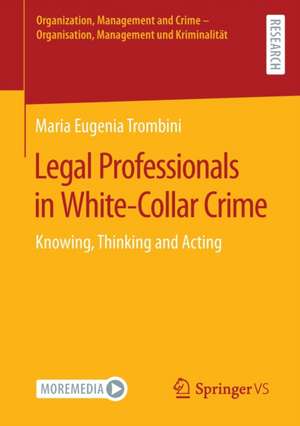Legal Professionals in White-Collar Crime: Knowing, Thinking and Acting: Organization, Management and Crime - Organisation, Management und Kriminalität
Autor Maria Eugenia Trombinien Limba Engleză Paperback – 26 feb 2023
Preț: 581.98 lei
Preț vechi: 684.68 lei
-15% Nou
Puncte Express: 873
Preț estimativ în valută:
111.37€ • 117.10$ • 92.02£
111.37€ • 117.10$ • 92.02£
Carte tipărită la comandă
Livrare economică 17 aprilie-01 mai
Preluare comenzi: 021 569.72.76
Specificații
ISBN-13: 9783658407469
ISBN-10: 3658407468
Pagini: 260
Ilustrații: XIV, 260 p. 37 illus.
Dimensiuni: 148 x 210 mm
Greutate: 0.36 kg
Ediția:1st ed. 2023
Editura: Springer Fachmedien Wiesbaden
Colecția Springer VS
Seria Organization, Management and Crime - Organisation, Management und Kriminalität
Locul publicării:Wiesbaden, Germany
ISBN-10: 3658407468
Pagini: 260
Ilustrații: XIV, 260 p. 37 illus.
Dimensiuni: 148 x 210 mm
Greutate: 0.36 kg
Ediția:1st ed. 2023
Editura: Springer Fachmedien Wiesbaden
Colecția Springer VS
Seria Organization, Management and Crime - Organisation, Management und Kriminalität
Locul publicării:Wiesbaden, Germany
Cuprins
Introduction.- Theoretical basis for studying legal professionals in white-collar crime.- Research design.- How do legal professionals think?.- How do legal professionals decide?.- Additional factors of explanations.- How autonomous has the legal elite been in respect to the state and the market?.- Conclusion.
Notă biografică
Maria Eugenia Trombini is a researcher at the Max Weber Institute of Sociology conducting work on organizational crime and systemic corruption.
Textul de pe ultima copertă
This work is dedicated to map the modes of thinking and acting of legal professionals who work in white-collar crime. Lawyers, whose decisions generate economic and political consequences, stand at a strategic location between the state and key segments of society. This monograph’s approach is linked to the foundations of the sociology of knowledge, that culture antecedes and anchors social action. It starts by reconstructing the worldviews that legal professionals hold about corruption and its main participants, and then advances to examine decision-making. The author is introducing an innovative dataset comprised of interviews, court records and biographical data to investigate Brazilian lawyers (1985-2021). The study’s qualitative findings show a professional cognitive pattern that is apolitical and technical, and criticizes unskilled people working in the state administration more than businesspeople. The dominant mindset understands corporate-state relations as a self-feeding system that requires qualification and awareness of international trends to counter crime. The decision-making patterns confirm: (i) that prosecutors and judges prioritize the ends, fighting corruption, and use existing legislation and organizational resources to secure verdicts; (ii) the asymmetries between how bribe-payers and bribe-payees are treated.
About the author
Maria Eugenia Trombini is a researcher at the Max Weber Institute of Sociology conducting work on organizational crime and systemic corruption.
About the author
Maria Eugenia Trombini is a researcher at the Max Weber Institute of Sociology conducting work on organizational crime and systemic corruption.







